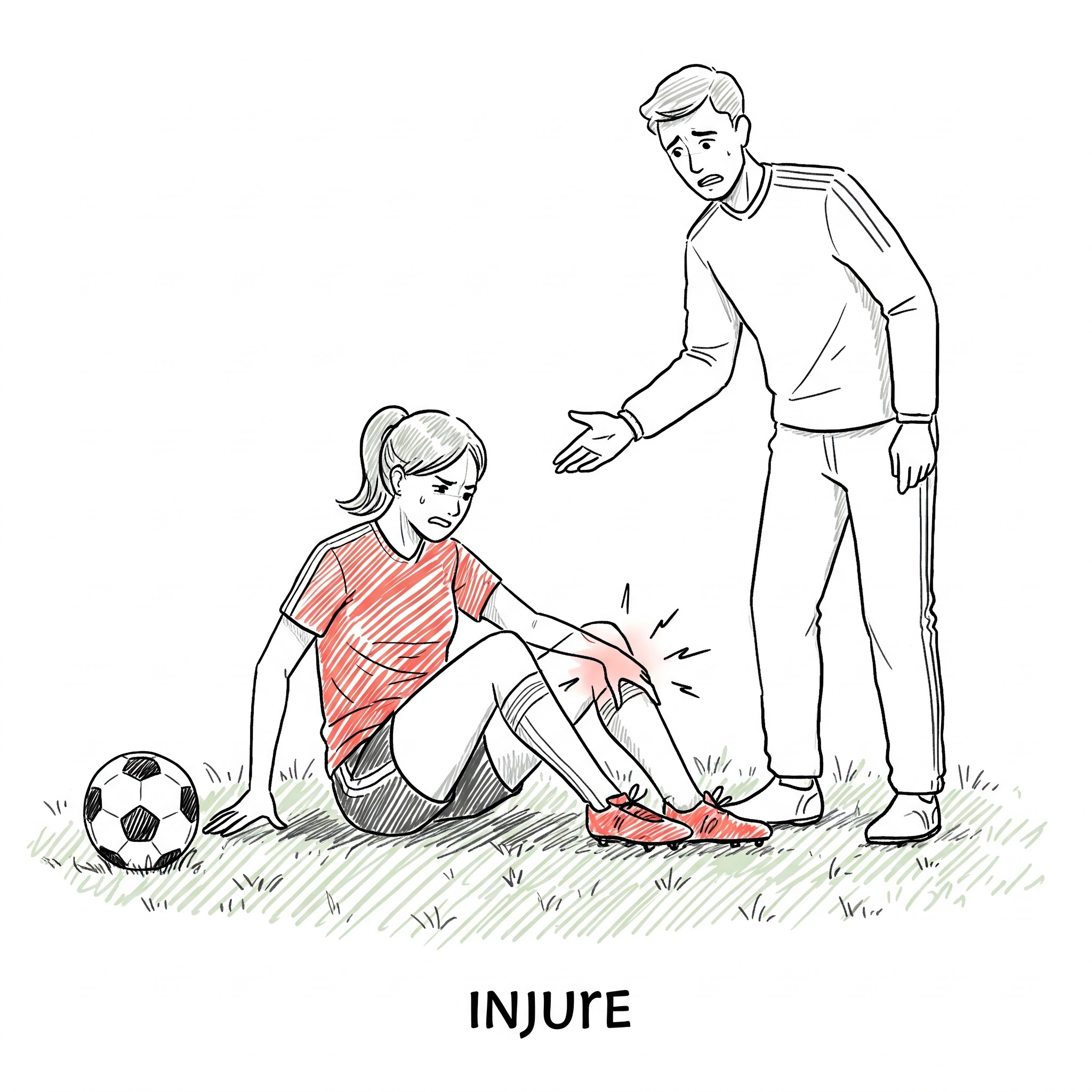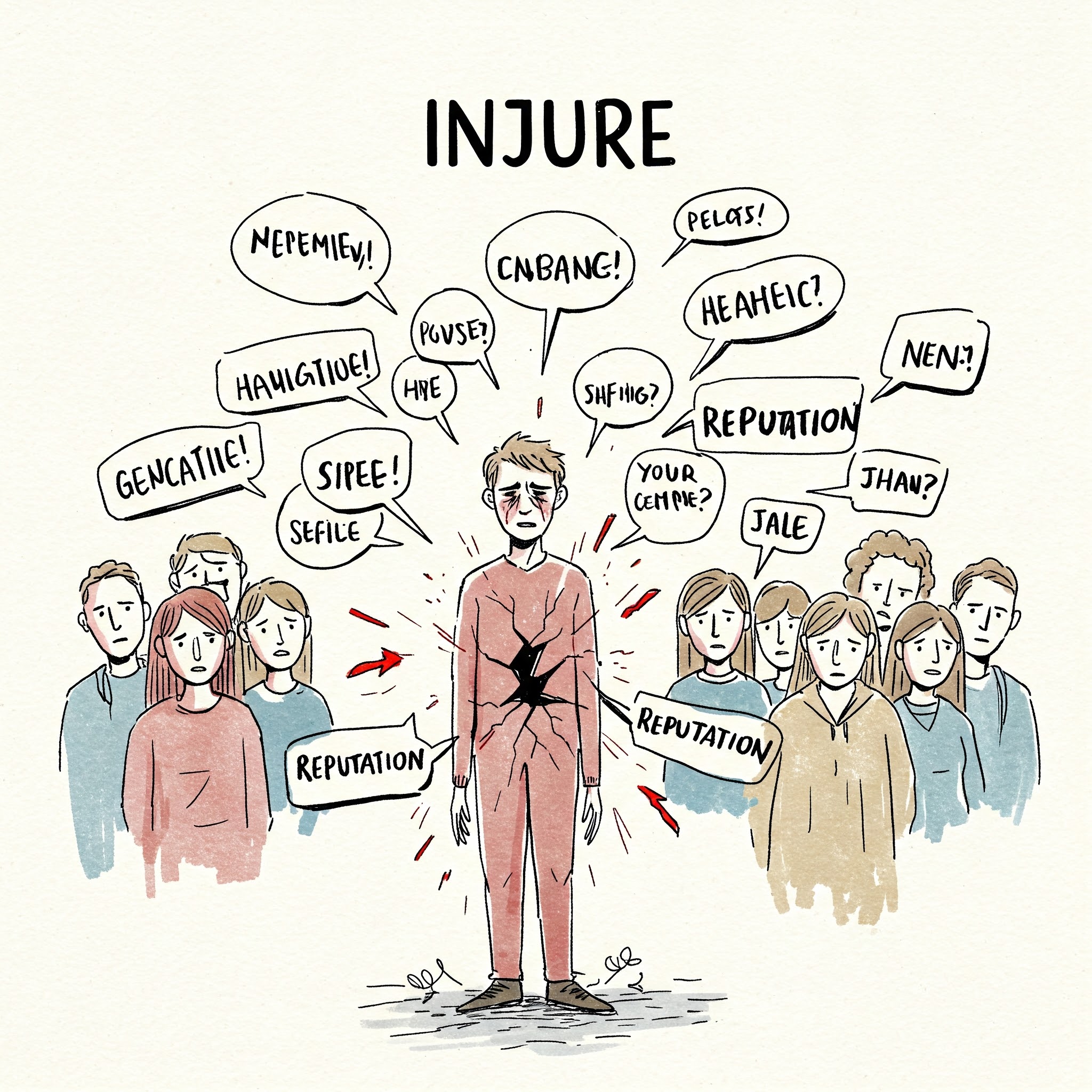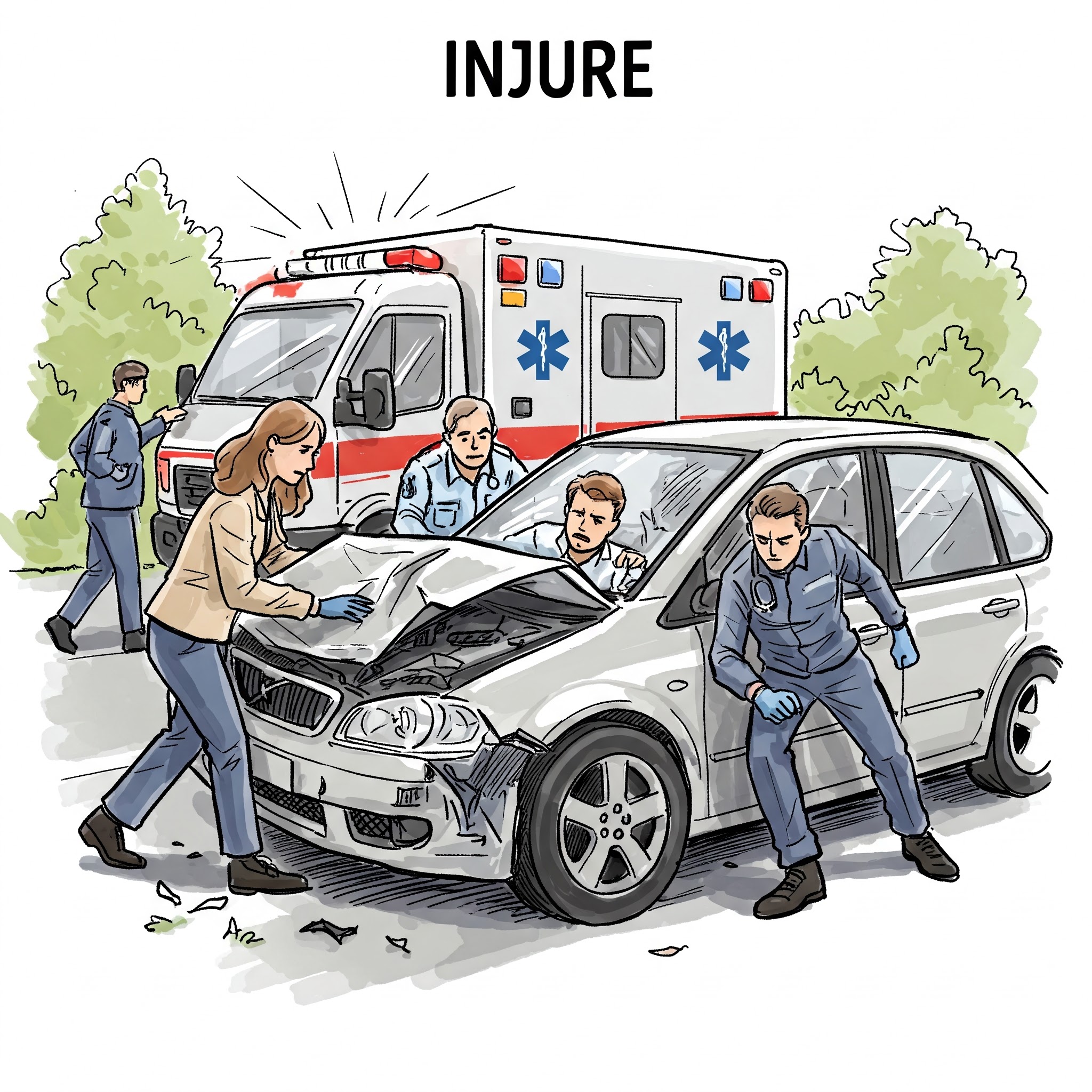Injure
Definition
Injure is a verb that means to cause physical harm, damage, or impairment to a person, animal, or object. It can also refer to harming someone's reputation or feelings.
Parts of Speech
- Verb
Pronunciation
American English
- IPA Pronunciation: /ˈɪn.dʒər/
- Respelling: IN-jer
British English
- IPA Pronunciation: /ˈɪn.dʒər/
- Respelling: IN-juh
Etymology
The word "injure" originates from the Latin "injuriare," meaning "to do wrong or harm," derived from "in-" (not) and "jus" (right, law). It entered Middle English in the 14th century through Old French "injurier," retaining its meaning of causing harm.
Derivatives
- Injury (noun)
- Injurious (adjective)
- Injuring (verb, present participle)
- Reinjure (verb)
- Non-injurious (adjective)
Synonyms
- Harm
- Damage
- Wound
Antonyms
- Heal
- Protect
- Repair
Usage
The term "injure" is commonly used in medical, legal, and emotional contexts. For example, "He was injured in a car accident," or "Harsh criticism can injure someone's confidence."
Related Terms
- Trauma: Severe physical or emotional injury.
- Damage: Physical harm that impairs value or usefulness.
- Wound: An injury to the body, typically involving a break in the skin.
Detailed Definitions
Verb
- To cause physical harm or damage: Refers to harming a person, animal, or object.
- Example: "She injured her ankle while playing soccer."
- To harm someone's reputation or feelings: Describes causing non-physical harm.
- Example: "The false allegations injured his reputation."
injure



🇨🇳 Mandarin
- 受伤 (meaning get hurt)
- IPA Pronunciation: /ʂǒu ʂɑ̂ŋ/
- English Respelling: shou shang
- 伤害 (meaning hurt)
- IPA Pronunciation: /ʂɑ̂ŋ hài/
- English Respelling: shang hai
🇮🇳 Hindi
- चोट पहुंचाना (meaning to cause injury)
- IPA Pronunciation: /tʃoːʈ pəɦʊɳtʃaːnaː/
- English Respelling: chot pahunchana
- घायल करना (meaning to wound)
- IPA Pronunciation: /ɡʱaːjal kəɾnaː/
- English Respelling: ghayal karna
🇪🇸 Spanish
- Herir (meaning to wound)
- IPA Pronunciation: /eˈɾir/
- English Respelling: e-rir
- Lesionar (meaning to injure)
- IPA Pronunciation: /lesjoˈnaɾ/
- English Respelling: les-yo-nar
🇫🇷 French
- Blesser (meaning to wound)
- IPA Pronunciation: /blese/
- English Respelling: bles-se
- Léser (meaning to harm, can be used for injure)
- IPA Pronunciation: /leze/
- English Respelling: lez-e
🇸🇦 Modern Standard Arabic
- يصيب (meaning to hit, can be used for injure)
- IPA Pronunciation: /jaˈsiːb/
- English Respelling: ya-see-b
- يجرح (meaning to wound)
- IPA Pronunciation: /jaʒruħ/
- English Respelling: ya-jruh
🇧🇩 Bengali
- আঘাত করা (meaning to hit, can be used for injure)
- IPA Pronunciation: /aːɡʱat̪ kɔra/
- English Respelling: aghat kora
- ক্ষতি করা (meaning to damage, can be used for injure)
- IPA Pronunciation: /kʰoti kɔra/
- English Respelling: khoti kora
🇷🇺 Russian
- Ранить (meaning to wound)
- IPA Pronunciation: /ˈranʲɪtʲ/
- English Respelling: ra-nit
- Повредить (meaning to damage, can be used for injure)
- IPA Pronunciation: /pɐˈvrʲedʲɪtʲ/
- English Respelling: po-vre-dit
🇵🇹 Portuguese
- Ferir (meaning to wound)
- IPA Pronunciation: /fɨˈɾiɾ/
- English Respelling: fe-rir
- Lesionar (meaning to injure)
- IPA Pronunciation: /lɛziõˈnaɾ/
- English Respelling: le-zion-nar
🇮🇩 Indonesian
- Mencederai (meaning to wound)
- IPA Pronunciation: /mentʃe'derai/
- English Respelling: men-che-de-rai
- Melukai (meaning to hurt)
- IPA Pronunciation: /melu'kai/
- English Respelling: me-lu-kai
🇩🇪 German
- Verletzen (meaning to injure)
- IPA Pronunciation: /fɛɐ̯ˈlɛtsən/
- English Respelling: fer-let-sen
- Schaden (meaning to damage, can be used for injure)
- IPA Pronunciation: /ˈʃaːdn̩/
- English Respelling: sha-den
🇯🇵 Japanese
- 傷つける (meaning to hurt)
- IPA Pronunciation: /kizu t͡sukeɾɯ/
- English Respelling: kizu-tsukeru
- 怪我をさせる (meaning to cause injury)
- IPA Pronunciation: /keɡa o saseɾɯ/
- English Respelling: kega-o-saseru
🇻🇳 Vietnamese
- Làm bị thương (meaning to cause injury)
- IPA Pronunciation: /lam ɓi˨˩ tʰwəːŋ˨˩ˀ/
- English Respelling: lam bi thuong
- Gây ra chấn thương (meaning to cause trauma, can be used for injure)
- IPA Pronunciation: /ɣaj˨˩ ɹaː cəːn˦ˀ˥ tʰwəːŋ˨˩ˀ/
- English Respelling: gay ra chan thuong
🇰🇷 Korean
- 다치게 하다 (meaning to cause to get hurt)
- IPA Pronunciation: /tʰatɕʰigɛ hada/
- English Respelling: da-chi-ge ha-da
- 부상시키다 (meaning to cause injury)
- IPA Pronunciation: /pusaŋʃikʰida/
- English Respelling: boo-sang-shi-ki-da
🇹🇷 Turkish
- Yaralamak (meaning to wound)
- IPA Pronunciation: /jaɾaɫaˈmak/
- English Respelling: ya-ra-la-mak
- İncitmek (meaning to hurt, can be used for injure)
- IPA Pronunciation: /ind͡ʒitme̞k/
- English Respelling: in-jit-mek
🇵🇰 Urdu
- زخمی کرنا (meaning to wound)
- IPA Pronunciation: /zəxmiː kəɾnaː/
- English Respelling: zakhmi karna
- چوٹ پہنچانا (meaning to cause injury)
- IPA Pronunciation: /tʃoːʈ pəɦʊɳtʃaːnaː/
- English Respelling: chot pahunchana





